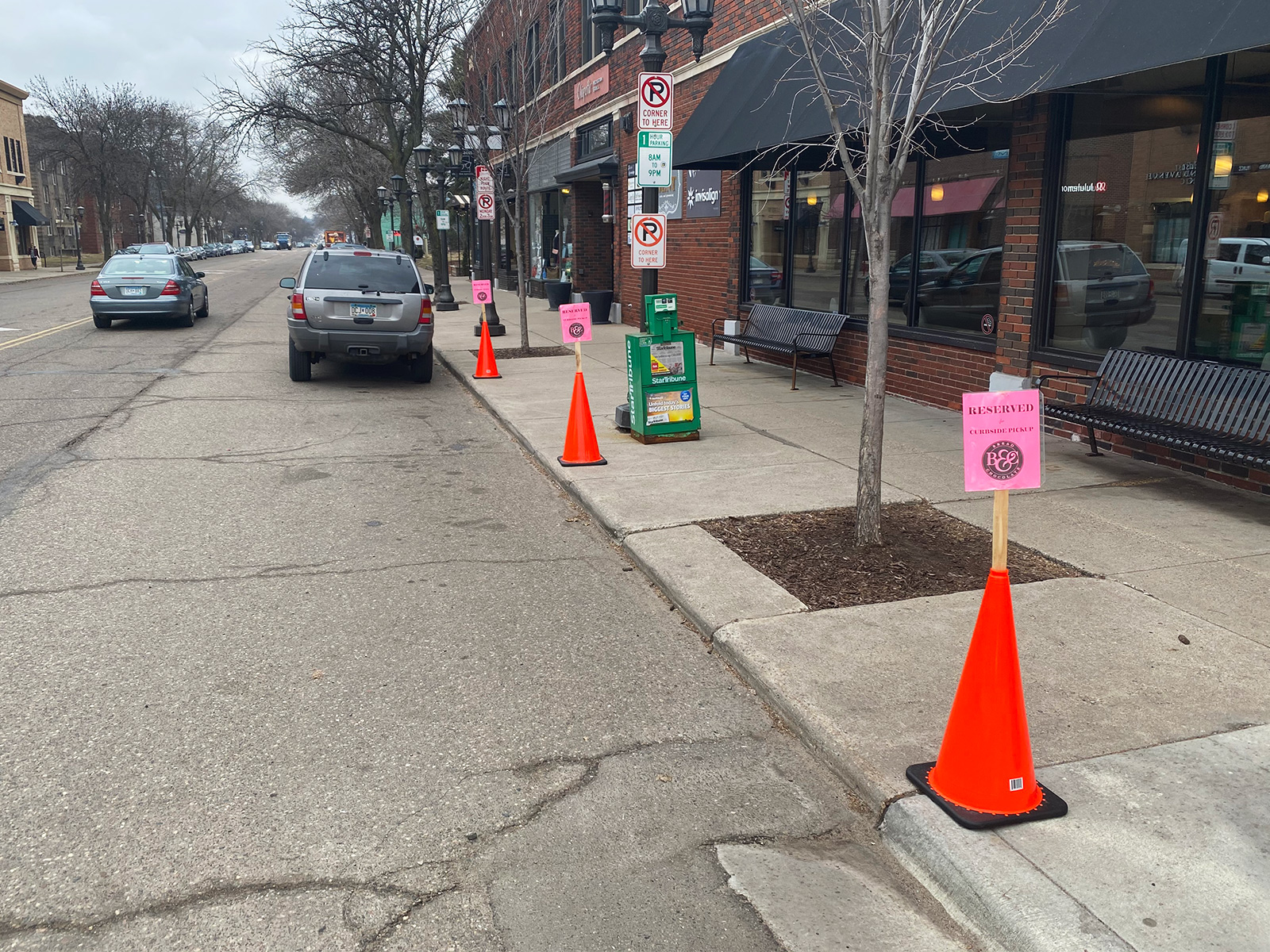A temporary curbside pickup zone in St. Paul, Minnesota.
COVID-19 has forced cities across the nation to quickly respond to the changing needs of the curb. Most communities have ordered the closure of non-essential businesses and anywhere people may gather: gyms, theaters, and restaurant dining rooms. Despite these closures, restaurants are offering takeout and delivery orders, increasing the immediate need for more curbside pickup space and short-term parking. This has required cities to quickly reconsider how their curbs are managed to address these changing needs.
Many cities are evaluating how parking and management of curb space can continue to support businesses while attempting to reduce the health and safety risks to community members. These efforts have centered around converting prime curb spaces to pickup zones or short-term parking and relaxing enforcement. Based on the needs of most cities during this time, some strategies to consider include:
Curb Management Strategies
- Designate spaces for short-term parking and pickup in the closest, most convenient on-street spaces, especially near restaurants.
- Reduce physical contact with meters/equipment by temporarily suspending payment/time-limits or switch payment exclusively to mobile payment.
- Implement a “parking ambassador” model of enforcement where officers use signage instead of direct contact to educate and guide people to properly use short-term spaces and loading zones and relax or eliminate citations.
- Temporarily cease citations of on-street residential parking restrictions to make it easier for residents to stay home and relaxing enforcement near pharmacies and grocery stores.
- Close parking lots at parks and beaches to limit crowds.
- Adequately clean dockless and docked bike and scooter share equipment and instruct riders to use gloves.
- Integrate curbside pickup locations on city websites and mobile parking apps.
How are Cities Responding?
San Francisco Bay Area – Multiple cities (Oakland, San Jose, San Francisco) have temporarily suspended parking enforcement including metered and time-restricted parking. Tickets will still be issued for any parking violations that may impact safety: parking in red zones, in front of fire hydrants, etc. Some Bay Area communities are also considering forgoing street sweeping parking violations.
“SFMTA has made a number of changes related to parking enforcement to aid our residents during the COVID-19 pandemic. This includes temporarily suspending enforcement of some regulations, such as 72-hour parking limits, other time limit parking and peak-hour towaway zones. These actions will make it easier for San Francisco residents to shelter in place and maintain social distancing.”
– Ted Graff, Director of Parking, San Francisco Municipal Transit Agency
Rockville, Maryland – Temporarily designated 40 on-street spaces in their Town Square district as 15-minute curbside pickup spots.
Seattle, Washington – Converted spaces in front of restaurants into temporary three-minute loading zones to allow people to quickly pull in and out for curbside food pickup.
Tempe, Arizona – Offering 30 minutes of free parking at 600 metered spaces.
Lexington, Kentucky – Converted several paid parking spaces into “curbside pickup only,” offering two hours of free parking at meters, and switched enforcement to time limits instead of payment.
Pasadena, California – Suspended enforcement of overnight parking bans and time limits in residential neighborhoods, as well as enforcement of street sweeping restrictions. Offering free curbside pickup parking and 20-minute free parking at metered spaces.
“The change in converting metered spaces to 20-minute spaces was made with the goal of maintaining on-street access to restaurants for meal pick-up by patrons and delivery services. Our enforcement changes were made to help our residents with the economic impacts of the pandemic.”
— Jon Hamblen, Parking Manager, City of Pasadena
The State of California – Closed parking lots at many state parks and beaches to limit crowds. California encouraged people to walk, run, hike, and bike in their local neighborhoods and to maintain a safe distance from each other.
Get in Touch
Want to talk to a Walker Consultants expert about managing your curb? Contact Chrissy Mancini Nichols, Walker’s curb management lead at cmancini@walkerconsultants.com

